Posted June 5, 2017 by Nicky in Reviews / 0 Comments
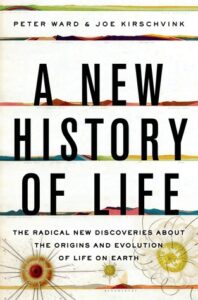 A New History of Life, Peter Ward, Joe Kirschvink
A New History of Life, Peter Ward, Joe Kirschvink
“New” is a bit of an overstatement. It develops themes already covered in books like Nick Lane’s Oxygen (not exactly recent) and David Beerling’s The Emerald Planet; the main contribution to my understanding is a bit more depth on how oxygen and carbon dioxide have limited and unlimited life over the course of its development. The back emphasises the authors’ belief in panspermia, specifically in the form that states life on Earth was seeded from Mars, but there’s very little space devoted to that — and exactly zero actual evidence.
It’s mostly a reasonable read, if not at all “new”, but they badly needed some more time with an editor. They have odd repetitions, or places where they don’t define a word until long after its first use (not a problem for me, but possibly difficult for other pop science readers), and at times the grammar is just terrible. Sentences don’t have subjects, or the verb doesn’t agree, or… It’s not so bad that I’d call it a mess, but I was very conscious that they needed a proofreader or three to make their book feel more professional.
There were some interesting things in here, though: for example, a discussion of different types of lungs and breathing systems. I hadn’t seen that discussed before, and it was fascinating. And for dinosaur aficionados, yep, they definitely touch on dinosaurs and why they once ruled the Earth (and why, perhaps, that rule ended as it did).
Rating: 3/5
Tags: book reviews, books, non-fiction, science
Posted June 4, 2017 by Nicky in Reviews / 0 Comments
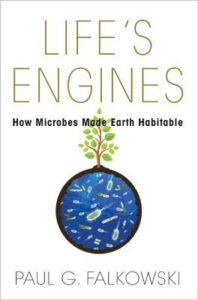 Life’s Engines, Paul G. Falkowski
Life’s Engines, Paul G. Falkowski
This is an accessible book, crystal-clear about all the concepts it discusses. It’s not bad as a revision guide for me, as far as some of my cell bio concepts go; it’d be good for an intelligent layperson. Falkowski writes with assurance, and though there were no surprises here for me, it was still an interesting read.
My only qualm would be that sometimes his choice of words is a little cringy to me. We don’t need “cell stuff”; I’m sure all readers at this level could manage the term “nutrients” or “proteins” or something clearer. Which is funny, given I just said he’s crystal clear — it’s not that the words are confusing, it’s just that they don’t actually make things simpler and easier to understand. They don’t actively obscure, but they do the reader no favours either.
Nonetheless, a book I enjoyed reading.
Rating: 4/5
Tags: book reviews, books, non-fiction, science
Posted June 3, 2017 by Nicky in Reviews / 0 Comments
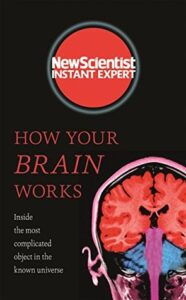 How Your Brain Works, New Scientist
How Your Brain Works, New Scientist
As ever with the New Scientist books, this is a great introduction to a topic — and in this case, it’s a fairly narrow topic: the brain, and how it works. It’s not just a collection of stuff that’s appeared in the other collections, although I think a few of the info boxes and so on did come from other New Scientist publications originally. It’s also based on one of their Instant Expert courses, a great series of events that I do recommend if they cover a topic you’re interested in.
For me, even without my degree, this was a fairly simplistic view of the brain — “instant expert” isn’t quite what you’d become from reading it, I’d feel. “Instantly more informed and able to understand further information with a good foundation,” perhaps.
Rating: 3/5
Tags: book reviews, books, non-fiction, science
Posted May 31, 2017 by Nicky in Reviews / 3 Comments
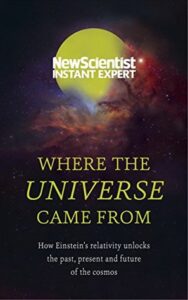 Instant Expert: Where the Universe Came From, New Scientist
Instant Expert: Where the Universe Came From, New Scientist
These books are based on the Instant Expert events that New Scientist hosts on various topics. I’ve been to two of them (one on genetics, one on consciousness), and they’re pretty great: pitched at a level most educated people can understand, but delving a bit deeper into some of the latest events and innovations in whatever area of science they cover. They generally have a panel of experts and, honestly, some pretty good food… Anyway, so I was interested to read this one, even without the good food.
Sadly, it’s more relativity than Big Bang; it’s more worried about how to resolve the issues between quantum physics and relativity than about what we do know. That said, it’s pretty accessible and I did follow most of it, which is more than can be said for most attempts to educate me about relativity. However, it does contain repeated material from New Scientist collections and possibly also previous books; how much, I couldn’t say, since I haven’t read those exhaustively.
Rating: 3/5
Tags: book reviews, books, non-fiction, science
Posted May 28, 2017 by Nicky in Reviews / 0 Comments
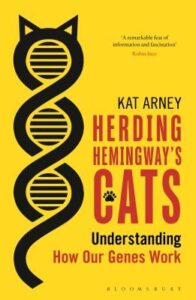 Herding Hemingway’s Cats, Kat Arney
Herding Hemingway’s Cats, Kat Arney
I didn’t expect to get that much out of this, since it explores the subject of genetics — I read a lot about genetics, after all, and have done one or two modules focusing on it. And it’s true that the tone is very light and journalistic, quippy and light and funny, but it also has an extensive section for further reading and covers some fascinating topics I didn’t know about. The section on epigenetics was particularly interesting; I’ve seen a lot of enthusiasm for epigenetics, of course, but this was a more measured and conservative interpretation.
It’s the kind of book that left me turning to my wife and saying, “hey, did you know…?” a lot, and looking up things online (like Minoo Rassoulzadegan’s white-gloved mice). There’s a lot of complications and new things coming out about genetics, and this proved to be an excellent survey of that.
The only thing I disliked was the way the interviews were presented — almost like a dialogue in a novel, but without new paragraphs for new speakers. It made it a little difficult to follow, and I’m not all that interested in what kind of shoes the scientist in question was wearing during the interview.
Rating: 4/5
Tags: book reviews, books, non-fiction, science
Posted May 24, 2017 by Nicky in Reviews / 0 Comments
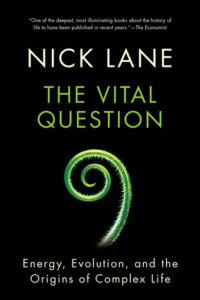 The Vital Question, Nick Lane
The Vital Question, Nick Lane
If you have a solid grounding in science already, particularly biology, this is probably going to be accessible for you — but if not, you might struggle a little. It starts off alright, but it gets quite dense in places, and if you’re not super-interested, you’ll probably get bogged down. That said, to me it was fascinating, and generated testable hypotheses about how early life could have functioned.
I still disagree with Nick Lane on some points, like the dismissiveness with which he treats “junk” DNA. But he covers a lot of interesting stuff about endosymbiosis, mitochondria, the way mitochondria work with the host cell, how the differences between bacteria and archaea arose… It’s a wide-ranging book, and it’s hard to summarise everything that he touches on.
He also makes some pretty bold predictions about life elsewhere in the universe — that it will work in pretty much the same way as it does on Earth. I don’t disagree with what he says here.
So all in all, a worthwhile read, but bring your thinking cap if you’re not a biologist.
Rating: 4/5
Tags: book reviews, books, non-fiction, science
Posted May 22, 2017 by Nicky in Reviews / 0 Comments
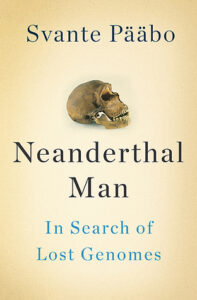 Neanderthal Man: In Search of Lost Genomes, Svante Pääbo
Neanderthal Man: In Search of Lost Genomes, Svante Pääbo
This book is less about Neanderthals themselves and more about the biological and technical details of extracting their long-extinct genomes from the preserved bones we’ve found, and also about Svante Pääbo himself — it touches on his bisexuality, his moves between institutions, even his affair with a colleague’s wife. I could’ve done without the personal info; it often felt like it was completely incidental to the extraction and sequencing going on in his teams. There were some interesting bits in the way his team worked together, and his decisions as the leader, but his affair with Linda Vigilant was entirely irrelevant.
Still, it’s a fascinating narrative taken as a whole, tracking the various theories, setbacks and new techniques Svante Pääbo and his team went through in finally extracting and sequencing the Neanderthal genome. There’s some coverage, too, of how it differs from the Homo sapiens genome and that of chimpanzees, and what that means in terms of phylogeny and the relationships in the family tree of human development. It also touches on some of the politics of science: rival groups, jockeying for funding, terminating partnerships which aren’t delivering what you hoped… A reminder that you’re never gonna get away from politics of some sort, I suppose!
I found it deeply interesting and well explained, though I am a little disappointed that it was more of an autobiography of Pääbo’s working life than about Neanderthals and what we know about them because of his work.
Rating: 4/5
Tags: book reviews, books, non-fiction, science
Posted May 20, 2017 by Nicky in Reviews / 0 Comments
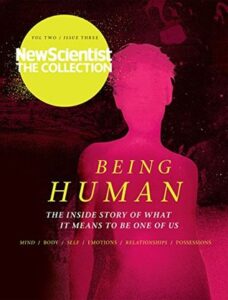 Being Human, New Scientist
Being Human, New Scientist
There’s perhaps not much to say about this collection: it’s much the same as the other New Scientist collections, in that it brings together a number of articles and features on a theme, using material from past issues. This is a bit more general than The Human Brain, of course, though it covers some of the same ground. If you read New Scientist religiously, none of this will be new to you; if you want to collect it in a more permanent form than the weekly issues, or grab one that’s on a specific topic, these are great for that.
To me, all of this is accessible, well explained and interesting. Your mileage may vary depending on what aspects of science interest you most.
Rating: 4/5
Tags: book reviews, books, New Scientist, non-fiction, science
Posted May 17, 2017 by Nicky in Reviews / 0 Comments
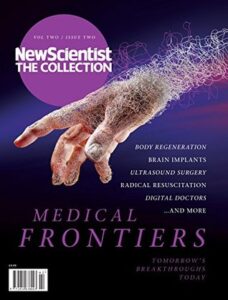 Medical Frontiers, New Scientist
Medical Frontiers, New Scientist
This is a bit different to the other New Scientist collections, in that it’s focused on the practical applications of science in one particular arena: medicine. I found it a fascinating look at medical technologies and theories, and how they might change healthcare. It’s the usual suspects, of course: stem cells, etc — and it touches on some of the past advances in transplantation, antibiotics and other drugs…
So it’s not quite the scale of relativity or dark matter, but to me it’s all the more fascinating for being relatable to everyday life. Like the other New Scientist collections, it’s a good way to catch up to and collect a bunch of articles on the topic.
Rating: 4/5
Tags: book reviews, books, New Scientist, non-fiction, science
Posted May 13, 2017 by Nicky in Reviews / 0 Comments
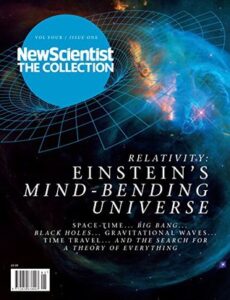 Relativity: Einstein’s Mind-Bending Universe, New Scientist
Relativity: Einstein’s Mind-Bending Universe, New Scientist
WHOOOOOSHHHH.
That sound? Oh, that was just most of this collection going over my head. It’s still good for the same reasons as the other New Scientist collections: it collects articles and features on a theme into one slightly more durable collection, so you don’t have to keep every issue of the magazine ever that contained stuff that really interests you.
Unfortunately for me, this is physics. A lot of the time I’ll understand perfectly while reading it, but I couldn’t explain it to someone else. Some of the time I won’t understand at all, and I’ll just skim past the words. Despite the assurances of the New Scientist employee who sold me this, I’m squarely in the latter territory for large stretches of this. It’s probably great if you understand physics and are really interested in putting in the time to understand it. I’m… not, really.
It’s an interesting collection, worthy topic, yada yada. I’m glad I had a crack at reading it. But… nope. Not for me.
Rating: 3/5
Tags: book reviews, books, non-fiction, science
 A New History of Life, Peter Ward, Joe Kirschvink
A New History of Life, Peter Ward, Joe Kirschvink








